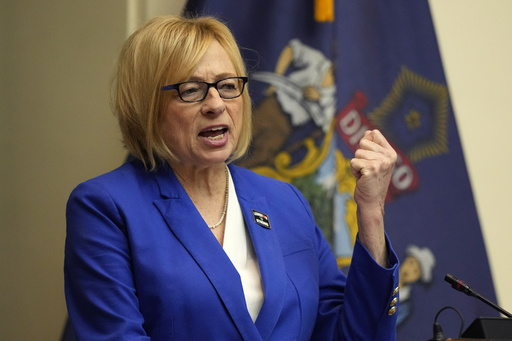In Portland, Maine, there has been a significant increase in law enforcement requests for court-ordered gun seizures from individuals considered a risk to themselves or others following a mass shooting incident, as stated by Governor Janet Mills. The state’s extreme risk protection order law was enhanced after a devastating shooting carried out by an Army reservist that resulted in the deaths of 18 people in Lewiston last October. Since the tragic event, the law has been invoked 15 times more frequently compared to the previous three years, according to Mills during a news conference on Friday.
Gov. Mills expressed that the surge in the utilization of the law indicates that law enforcement agencies in Maine are taking this legislation seriously and have undergone training provided by the state on its application. This has led to the daily removal of firearms from individuals who are deemed unfit to possess them.
Details on how frequently courts have granted these requests under the updated statute were not provided by the governor. Supporters of gun control emphasize the importance of these red flag laws as a vital measure to prevent dangerous individuals, particularly those with severe mental health issues, from accessing firearms. Conversely, opponents within the gun lobby argue that such laws violate individuals’ constitutional right to bear arms.
Mills’ news briefing coincided with the release of a report by the state police outlining the key takeaways following the mass shooting in October 2023 and presenting multiple recommendations for enhancements in tactical response, incident management, training, and other critical areas.
Some of the key recommendations from the report include the implementation of new active-shooter training for a more coordinated response during significant incidents or instances of mass casualties. The shooting, which unfolded at a bowling alley and a bar and grille, involved an Army reservist whose mental health had been deteriorating in the period leading up to the attacks.
Subsequent to the shootings, the shooter, Robert Card, was discovered deceased following an extensive search. Governor Mills assigned an independent commission to review the circumstances surrounding the assault. The commission’s report, made public last month, highlighted missed opportunities by the Army Reserve and police to intervene in Card’s mental health crisis and take steps to confiscate his weapons.
During her remarks, Mills concurred with the report’s conclusions and noted that the Sagadahoc County Sheriff’s Office could have invoked the risk protection order but did not do so. She characterized the tragedy as a failure of judgment and negligence by multiple individuals on various occasions. The state police report was commended by Mills for its transparency, and an independent review of the findings is set to be carried out by the New England State Police Administrators Compact.
Aside from pinpointing areas of concern, the state police report acknowledged instances where law enforcement adhered to best practice standards. Regarding the work of the Maine State Police Tactical Team, the report deemed the manhunt for Card as overall successful, with his apprehension within 48 hours without further harm to the public or law enforcement.
However, the report also pointed out issues such as an influx of uncoordinated officers to the scene. Recommendations within the report stressed the importance of cautioning against self-deployment during emergencies, ensuring swift search procedures at a suspect’s residence, and emphasizing the need for immediate processing of key areas for real-time intelligence during apprehensions.
Areas of improvement highlighted within the report included delays in the search of Card’s residence and instances of uncoordinated responses from law enforcement at critical junctures. It stressed the necessity for enhanced training and strategies to streamline responses in emergency situations.


